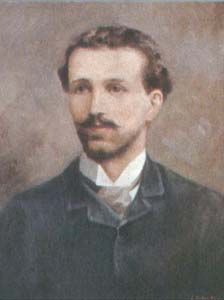José Asunción Silva facts for kids
Quick facts for kids
José Asunción Silva
|
|
|---|---|
 |
|
| Born | José Asunción Silva Gómez 27 November 1865 Bogotá, Colombia |
| Died | 23 May 1896 (aged 30) Bogotá, Colombia |
| Occupation | Poet, author, political figure |
José Asunción Silva (born November 27, 1865, in Bogotá – died May 23, 1896, in Bogotá) was a famous Colombian poet. Many people see him as one of the main people who started a new style of writing called Latin American Modernismo.
Life of José Asunción Silva
José Asunción Silva grew up in Bogotá in a rich and educated family. He started writing poems when he was only ten years old. In 1882, he traveled to Europe, visiting England, Switzerland, and France. In Paris, he met other important poets and artists like Stéphane Mallarmé and Gustave Moreau. His trip to Europe really changed his writing style, and he started using many French ideas in his poems.
However, things became difficult for Silva. His father passed away, and his family faced big money problems. Silva had to return to Colombia to help. He couldn't pay his family's huge debts. So, he took a job as a diplomat in Caracas. While there, other writers encouraged him to focus on his poetry. In 1892, his beloved sister, Elvira, died, which was very sad for him.
In 1895, many of Silva's writings were lost in a shipwreck. This included his most important prose work. Even though he was able to rewrite one of his novels from memory, losing his sister and his writings deeply affected him.
Death and Legacy
José Asunción Silva passed away in Bogotá in 1896. He was buried in the Central Cemetery in Bogotá.
One of his most important legacies is the house where he lived. It has been turned into a museum called the Silva Poetry House. This museum helps people learn about his life and his amazing poems.
Famous Works and Style
People have discussed whether Silva was just a start to Modernism or a true Modernist poet. But many experts agree he was a "fully developed" Modernist. Modernism was a new way of writing that broke away from older traditions.
Some of his work, like the collection Bitter Drops (Gotas Amargas), is praised for its language. It used everyday words in a new, rebellious way. The poems often had a skeptical and humorous tone, breaking with old literary and social rules.
His most famous poem is "Nocturno" (meaning "Nocturnal"). It was published after he died in 1908. This poem was written in free verse, which was a new style at the time. It didn't follow the old rules of Spanish poetry and showed many signs of Modernism. "Nocturno" was written because of the death of his sister, Elvira. The poem uses images, especially the symbol of a shadow, to show feelings of sadness.
You can even see José Asunción Silva's face on the 5000 Colombian peso bill. The entire "Nocturno" poem is printed in tiny letters on the bill!
- El libro de versos (published after his death in 1923)
- De sobremesa (published in 1925; meaning In After-Dinner Conversation)
See also
 In Spanish: José Asunción Silva para niños
In Spanish: José Asunción Silva para niños
 | Anna J. Cooper |
 | Mary McLeod Bethune |
 | Lillie Mae Bradford |

